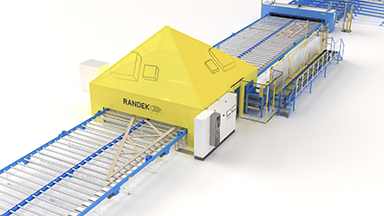
WORK is underway at Pasquill’s Redhill site in Surrey, in readiness for the installation of the Randek AutoEye automated truss manufacturing system. Pasquill is one of the first UK truss rafter brands to invest in Swedish company Randek’s AutoEye and the installation of the new system will help to increase capacity at Pasquill and improve safety on site.
The £4 million investment will see the installation of the AutoEye system, which will boost the capacity of trusses manufactured from the site while allowing more complex trusses to be produced in significantly less time. While the system itself won’t be installed until November, work is underway now to prepare the groundworks ready for the machinery.
The AutoEye system helps to streamline the production process by visually identifying the joints in the truss, then picking, placing, positioning and pressing the nail plates with the required force, which is determined by the machine. The AutoEye system will offer up to a 50% time saving during manufacturing, which will support demand during peak periods.
Its semi-automated setting process will ensure the quality of Pasquill’s trusses remains high, as human interaction is still required during the early stages of manufacture. However, with a long-standing construction skills shortage in the UK, it is hoped that automating the truss production process will free up workers at the Redhill site, allowing them to continue with other projects in the business.
Until now, Pasquill’s Redhill site has been operating at full capacity, but the introduction of the AutoEye technology will see the site significantly expand its capabilities, allowing for approximately double the output for the same amount of labour.
The introduction of the AutoEye will also increase safety within the factory, as it will reduce the amount of manual labour required by the Pasquill team, with the bulk of the truss production process controlled by the AutoEye Truss System. With zero manual set-up required, trusses produced from the Redhill site will be more accurate and will be manufactured well within the recommended tolerances.
Its automated plate placement and pressing, combined with a nailing bridge system removes the need for working at height, further increasing safety for the Pasquill site teams.
With the system being located at Pasquill’s Redhill site in Surrey, it is ideally situated to minimise transport costs to the South East of England, saving time and money for both Pasquill and their customers.
As part of the £6 million overall investment, Pasquill’s Stoney Stanton site in Leicestershire has received production of Posi-Joists and JJI Joists, which have been moved from the Redhill site to create space for the AutoEye machinery. This further diversifies the Midlands-based site’s product offering, allowing for increased output and productivity.
Chris Powell, sales and design director at Pasquill, says of the investment: “By investing in this level of automation, Pasquill are proving their commitment to delivering higher quality products which are cost-effective to both the business and our customers.
“We are proud to be the first business in the UK to receive the Randek AutoEye Truss system. It will allow us to boost our capacity without the need for additional manpower, which is crucial as we continue to see a shortage of skilled workers in construction. We look forward to the installation of the automation system, and seeing the benefits it brings to us as a business, our customers and the wider house building industry.”
Gordon Young, Randek UK director, says: “Return on Investment (ROI) is of paramount importance, both in the short and long term. The true savings become evident when you consider that the AutoEye has the highest accuracy and consistent output on the market, minimised production downtime, and zero setup time due to the reliability of a Randek line.
“In order to maintain a leading position in the roof truss production market, Pasquill allocated a substantial amount of funds for a new automated truss production line. In their investment decision, they prioritised output and safety, and selected Randek.
“With years of industry experience, we understand that inexpensive quick solutions rarely yield worthwhile returns.”
See page 7 of our August/September 2024 issue on our Back Issues page.

